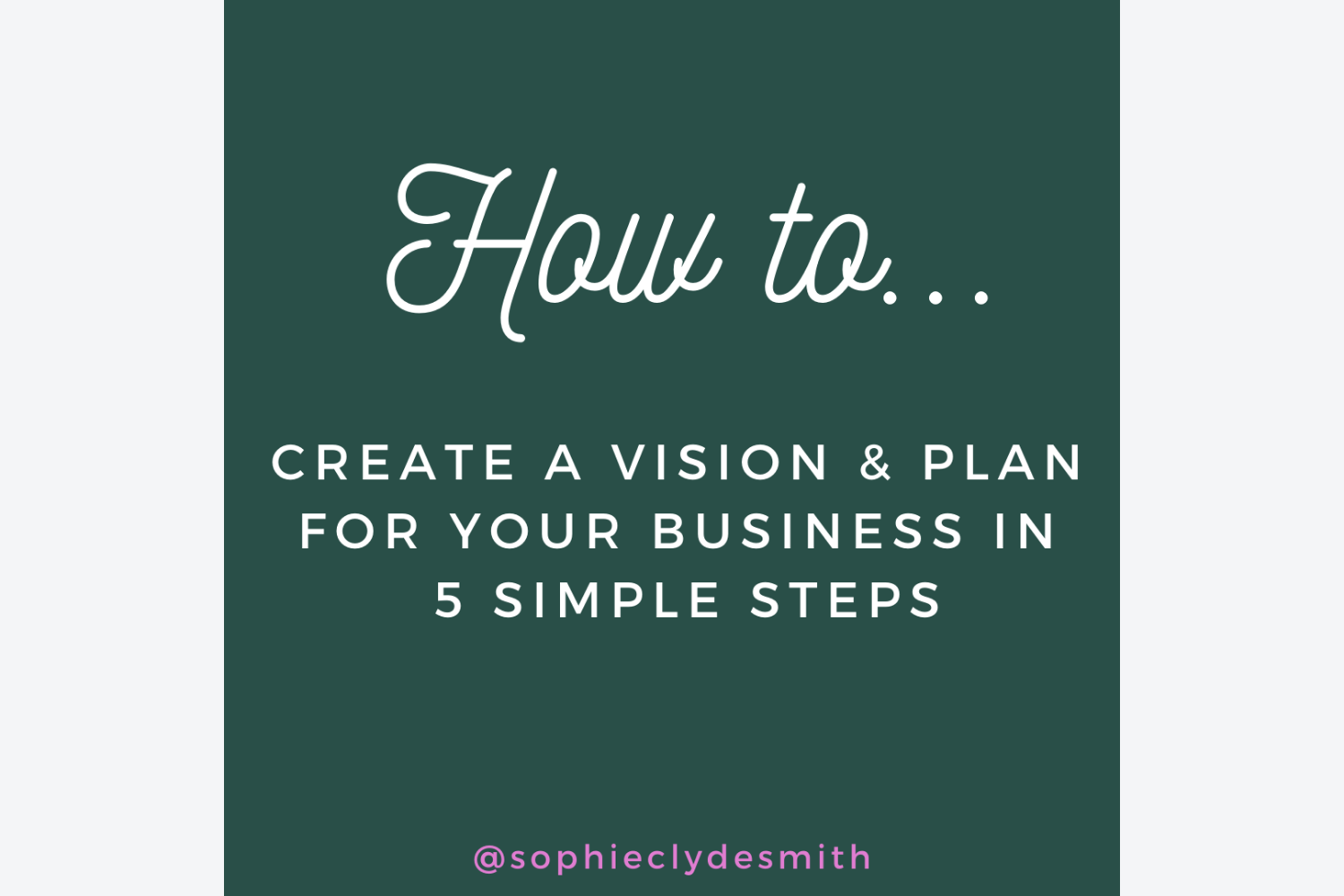Your guide to creating an authentic vision & action plan for your online-service based business that will get you unstuck, give you direction and get you seeing results.
A business plan is a formal written document containing business goals, the methods on how these goals can be attained, and the time frame within which these goals need to be achieved.
A business plan can turn your ideas into a reality – giving you a clear plan.
One of the big challenges I see female solopreneurs dealing with is a lack of vision and lack of clarity on what they should be doing each day/ week/ month in their businesses.
This translates into overwhelm, frustration, that feeling of not making any progress, of the weeks rolling by without moving forward, feeling stuck, not getting results, comparison and self-doubt.
You may be asking yourself questions like… What do I really want? Where am I going? How am I going to achieve my vision? How am I going to realise my dreams? What should I be doing? How do I make all these decisions – what is the right thing to do?
Business planning is the answer to all these questions.
Some of you may have already explored doing a business plan and others may not even have heard of one. Wherever you are on the scale – in this blog, I’m going to cover the most important basics helping either introduce you to this subject or refresh and reinvigorate what you’re already doing.
The purpose of a business plan is to help lay some strong foundations in your business, to gain clarity on where you’re heading and to ensure the action you take is moving you towards these goals.
My experience of business planning…
I first gained experience in putting together a business plan when I was interviewing to join a startup company. As part of the interview process, I was tasked with putting together a business plan for the function I was to be in charge of.
This was petrifying – I had no idea how to do it! Thank goodness for google.
Frantically searching through reams of website pages, I found the different parts I needed to focus on and went to work. I was able to put together a strong basic document that ended up winning me the position.
But what about in my own business?
I’m going to be really honest with you – I did not initially put together a business plan for my business. I had very clear goals and plans that I worked to, and these worked for a good while. In fact, they really served me. But I lacked deep strategy, long term vision, connected goals and effective decision-making skills. All of this was limiting the success and enjoyment I was experiencing in my business.
I now make sure that I do have strong, regular planning habits BUT I don’t go overboard…. I don’t spend hours/ weeks creating a document – I keep my business plan relatively light.
I like to be able to flex to opportunities that I create, but cannot predict, and factor these into my business planning.
I have sometimes heard from entrepreneurial peers that they’ve spent ages putting together a really detailed and in-depth business plan, and then the document becomes somewhat obsolete as new ideas/ collaborations/ partnerships come their way.
It may well be that a business plan is essential to your success in which case I would invest the time and energy into doing it. Also, certain circumstances dictate a more robust business plan, for example; if you’re seeking investment, working with a business partner, if you’re a product-based or brick & mortar business.
My personal experience as a female solopreneur with an online service-based, business who has no external investment, and does not sell tangible products is that the lighter business planning version is more than sufficient.
Keep reading to access the 5 steps simple guide I use for my own planning.
This is about you understanding your skills, strengths and personal situation and being able to effectively plan in your business in an AUTHENTIC way.
If you’re super intuitive and soul-driven or a big ‘ideas’ person, you may need to adjust the way you approach this. Ignoring it all together is not the answer. You may need to partner with someone like a coach to really help provide the structure and tease out all those dreams onto paper.
If you’re a very analytical and process-driven person you must be conscious too – you don’t want to overthink this process and for it to get you even more stuck. Working with your coach would be more focussed on clarity, helping you to courageously make decisions and move on without over analysing or being hard on yourself.
Take a moment to reflect on your own personality and traits – what could be your best approach to creating a business plan?
If you’re going to do it – use it as a working document. Update it every 3 months (I recommend updating it in the final month of each quarter so you’re ready for the next one). If you want help with this check out my one-off business planning intensive session.
Use it to create milestones and tangible goals which translate into weekly and daily plans of action.
Make it living and breathing.
So what is a business plan actually made up of?
The Princes Trust have a solid template to get you started. As a quick overview, it includes the following sections:
- Executive Summary
- Your background; career history
- Products and services that you will look to offer.
- The market; customer personas, ideal customers, needs and pain points. What is going on in the market place; what are customers wanting
- Market research; desk research, data, reports, keyword trends OR field research
- Marketing strategy
- Competitor analysis; SWOT
- Operations
- Costs and pricing
- Financial forecasts; figures and finances
I, however, prefer a really great business plan model from Phil Fraser which is slightly simpler than the one from the Prince’s Trust. Phil Fraser is a successful businessman and now mentors startups, often using his template as a foundation.
In this simple yet highly effective planning model Phil Fraser asks you to think about 5 questions. Using my experience of coaching female solopreneurs I have slightly adapted the questions.
I have balanced out Phil’s masculine approach with some feminine perspectives, I have expanded some of the questions and I have added some content to incorporate authenticity and deep connection.
If you would like to see Phil’s original questions, please access them here.
FRASER’s FIVE STEPS TO WRITING A BUSINESS PLAN
- VISION & MISSION
Where do you want to be in a year’s time? What does the dream scenario look and feel like to you? If nothing was holding you back, where would your business be in a year time? What is the purpose of your business? How do you want to uniquely serve others? Who is your target audience or ideal client? What is the mission of the business?
I personally prefer to use a timescale of 3-months rather than a year. I’ve always been much better at these 90-day bite-sized chunks and particularly in the current uncertain climate caused by Covid, I’m hearing from clients that 12-months is just too long. Check out my blog on the 12-week year to discover more.
2. STRATEGY
What needs to be in place to make the mission & vision happen? What needs to be in place to deliver it? What are the milestones that will help you reach it? What will help you achieve your vision & mission? Conversely, what is stopping you delivering your ideal scenario? What is holding you back? What is your marketing strategy? What is your sales strategy? Do you need to develop/ refine a sales funnel? Do you need to do any work on your sales and marketing mindset? What new products might you want to develop to execute the strategy? What current products do you have? What processes need to be in place to support all of this? Are your financial goals connected to your marketing and sales strategy?
3. TACTICS
How do you put the strategy in place? Consider Marketing/ Sales/ Operations/ Products/ Financials.
4. ACTIONS
Put the tactics in a priority/logical order. Do the first one first….. And then…what happens next, when does it happen, what are the targets, budgets etc
5. CONTROL/ MEASURE
Put measures in place to ensure that the actions are being done. How will success be measured? How will you know you’re moving forward? How will you celebrate your success? How will you track your progress?
The end goal is to have an action plan in place to deliver your mission and vision.
Carve out some time and space to work on this document. Shift your perspective around business planning from something daunting and scary to an exciting way for you to move forward with your business. This is one of THE most effective ways to ensure your success.
If you are a female solopreneur with an online service-based business that needs help and would love to be expertly supported through this process, check out this amazing offer I have put together for you.
Make this process authentic and effective.
I am hugely passionate about also advocating an authentic approach for female solopreneurs.
You are on a beautiful journey – your business is your baby, it is an extension of who you truly are. Avoid getting too influenced by what everyone else is doing and instead, get inspired, pick and choose what resonates.
Above all, I truly want to share the message about this being a living and breathing document which can take the pressure off that we, as women who work on our own, put on ourselves.
Once you have created it, it is the framework from which all your daily actions and weekly goals are achieved. But it’s not a binding contract and you’re not stuck with it for life. Adjust the plan as new opportunities arise, and especially as you work through limiting beliefs and your vision expands.
When I first started my business, I had a vision of what I wanted to succeed. But as I started to execute on this and I actually started to achieve it, I grew in confidence, I learned and I started to grow out of that first vision.
So I regularly revisit this business planning exercise (every 3 months on average – sometimes less, sometimes more) allowing it to grow and expand as I do.
**********************
So there it is my introduction, overview and ‘let’s get started’ approach to writing an effective business planning for female solopreneurs.
When are you going to get yours done?
Stay connected to the PURPOSE of this exercise which is to ensure you have clarity on what you’re doing each day and the actions you take are connected to your long term vision.
Have any questions on how to write a business plan? Feel free to drop me a message on: [email protected]
Weekly Newsletter
Sign up for weekly inspiration, tools and confidence to help you grow your business.
RELATED POSTS
TRANSFORMATIONAL LIFE COACHINGBusiness CoachingMindset
11th October 2024
How to Quit the Comparison Game: 10 Tips for Female Entrepreneurs
We’ve all been there—walking into a room or scrolling through social media, only to…
GOALSBusiness CoachingBusiness Strategy
24th June 2024
Boosting Productivity: The Power of High Value Activities for Solopreneurs
As a solopreneur, time is our most precious asset, directly impacting our business…
20th June 2024
Balancing Business and Motherhood: Tips for Female Solopreneurs
Motherhood is a beautiful, fulfilling, and expansive experience, but it's also…
Sophie Clyde-Smith
Female solopreneur business coach focussing on mindset and strategy.






